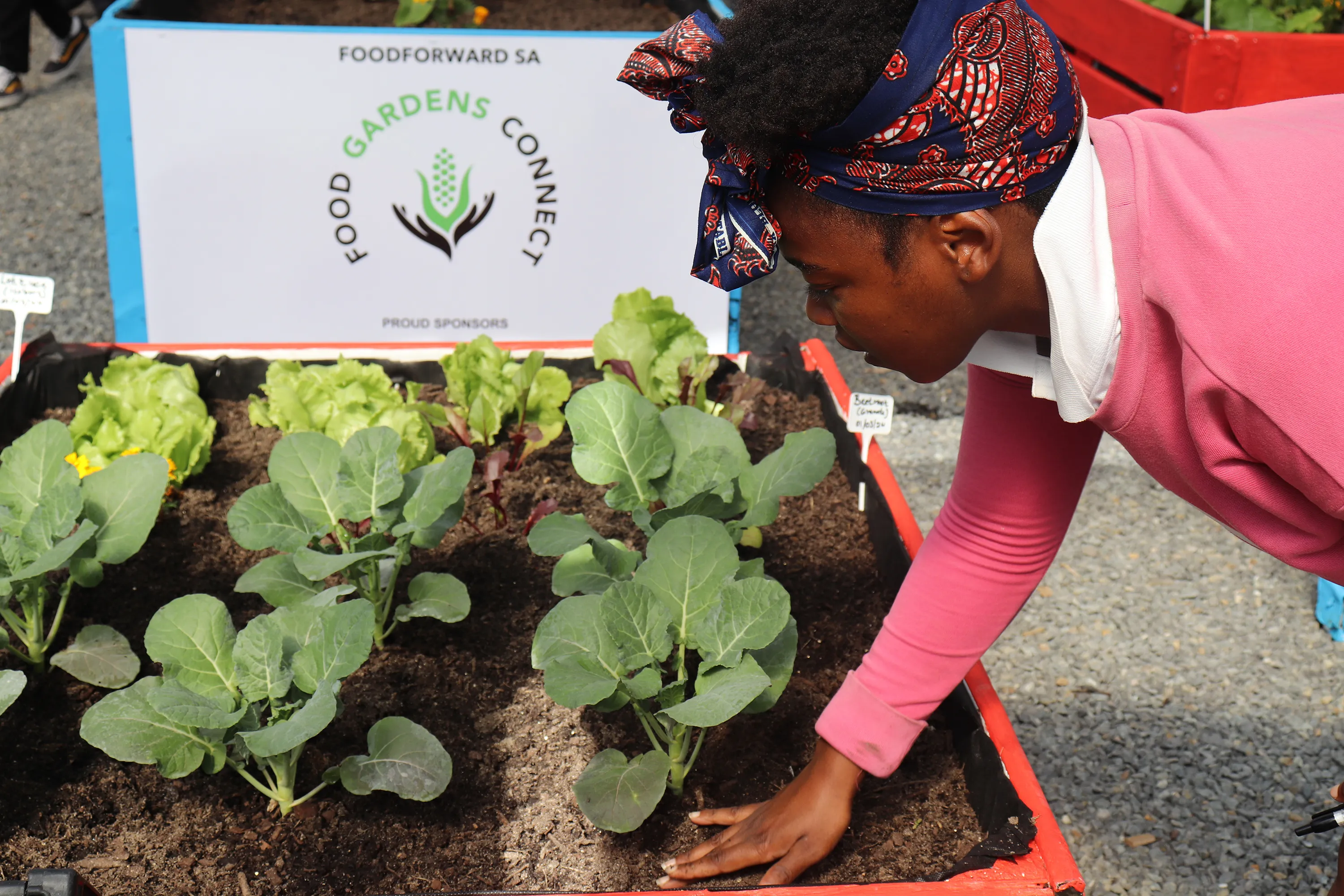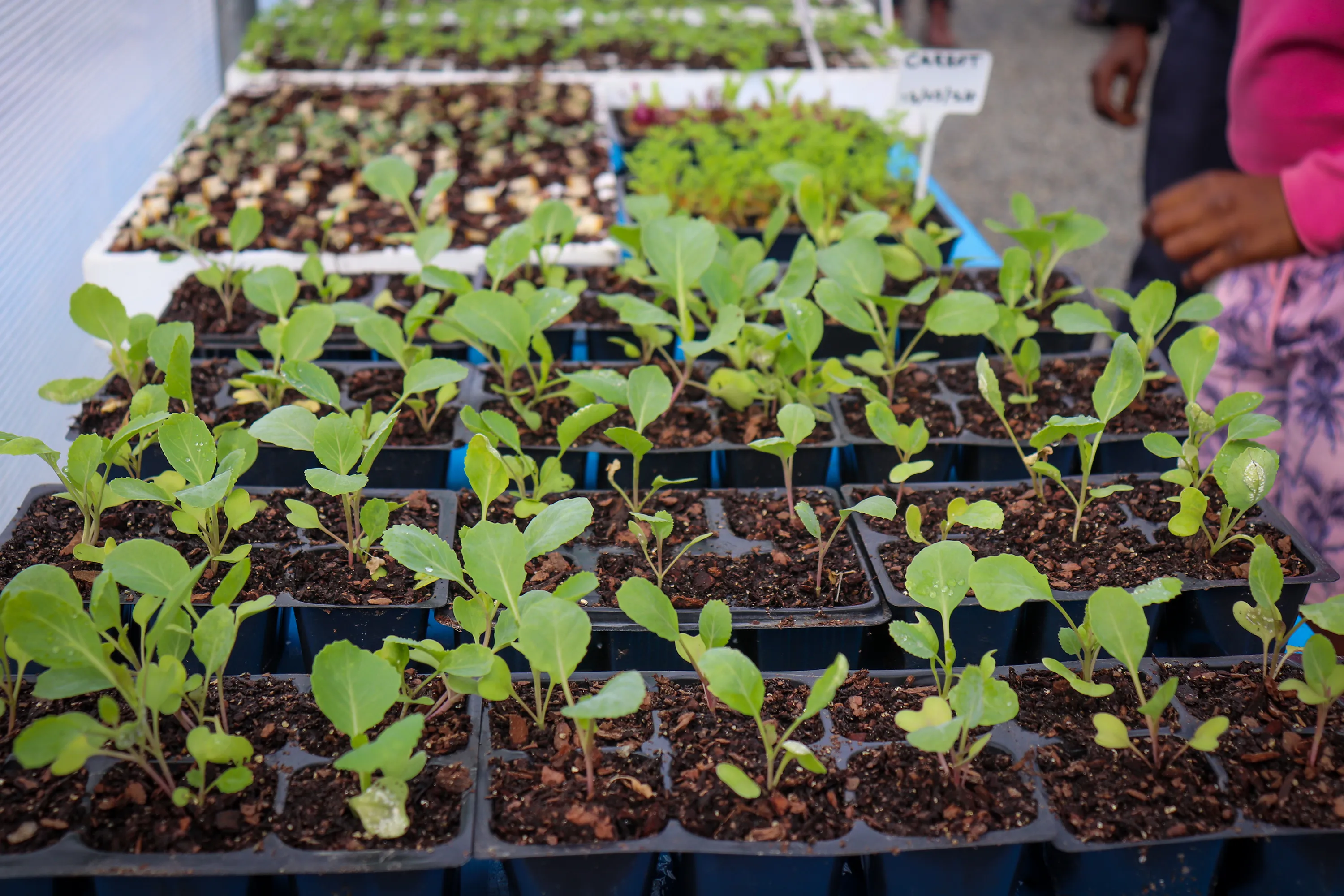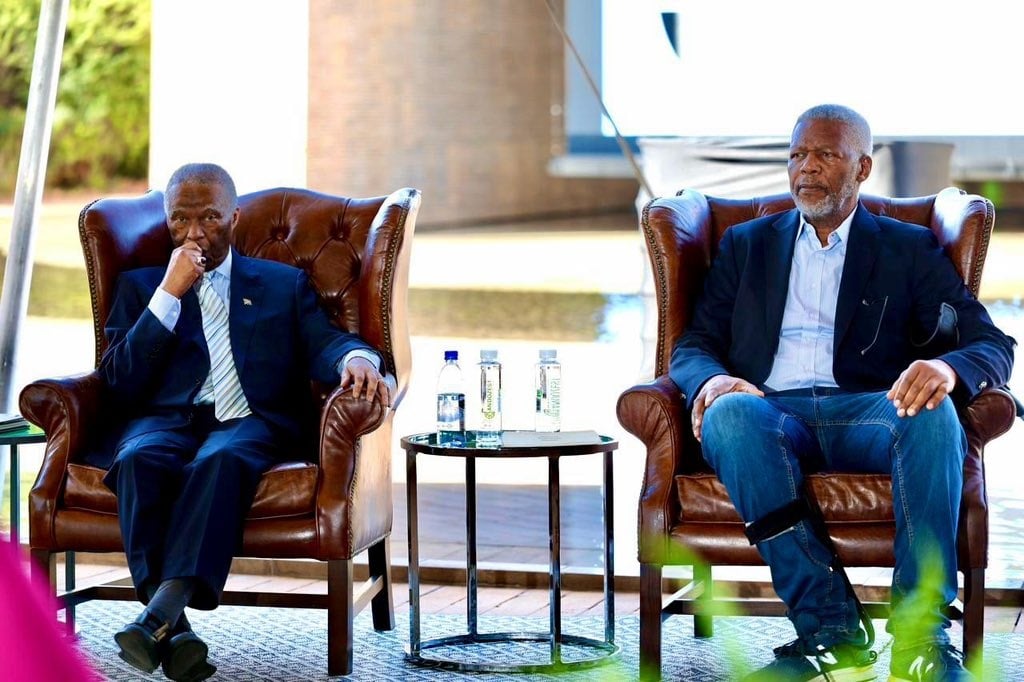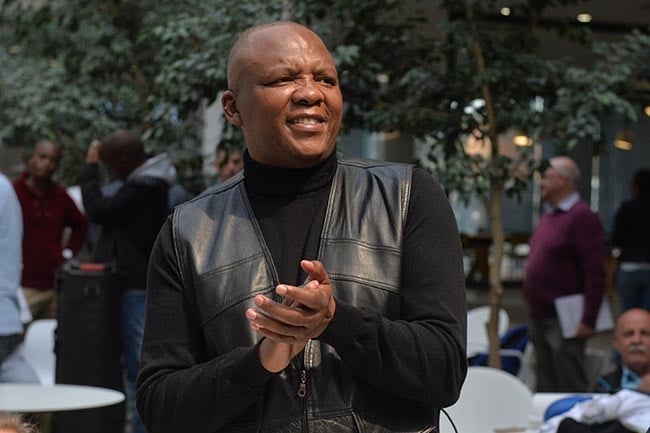Having to battle constantly to feed her household, NoFirst Mdlaza (59) from Kwakhanya in Khayelitsha was teary-eyed as she spoke to Daily Maverick about being able to grow her own food and receiving food parcels during a time of food insecurity, when no or little food is available because of high food prices in shops.
Mdlaza is one of 10 previously unemployed people from the Kwakhanya project who have been trained by the non-profit food redistribution organisation FoodForward SA this year to cultivate a food garden, sustainably provide food for their families and sell their produce for an income, as part of the new Food Gardens Connect initiative.
Through Food Gardens Connect, FoodFood SA is encouraging vulnerable communities to grow sustainable food gardens designed to improve food security, advocating for sustainable farming practices and fostering economic empowerment within the communities.
The food insecurity ravaging vulnerable communities across the country, has been largely attributed to rising food prices, unemployment, poverty, inequality and climate change. One measure to reduce this crisis is encouraging household participation in agricultural activities to produce their own food.
NoFirst Mdlaza from the Kwakhanya Project in Khayelitsha at the food garden in Lansdowne, Cape Town, on Wednesday, 17 April. (Photo: Kristin Engel)
According to a CSIR study, an estimated 10.3 million tonnes of food intended for human consumption is lost each year in South Africa. This amounts to 34% of the food produced locally, but as South Africa is a net exporter of food, the losses and waste represent 45% of the nation’s total food supply.
Read more in Daily Maverick: SA faces a catastrophic hunger crisis while 10m tonnes of foodstuff goes to waste every year
This suggests significant inefficiency in South Africa’s food value chain at a time when the country’s food insecurity is rising.
FoodForward SA has a strategic approach to combating food insecurity that revolves around recovering and using surplus food of good quality and within date from the food system, to fortify and uplift underserved communities and reduce commercial food waste.
Now, together with beneficiary organisation Kwakhanya, it has launched two sustainable food gardens in Lansdowne and Khayelitsha. In addition, a tunnel garden at FoodForward SA’s Lansdowne warehouse will be used to nurture seedlings, ultimately contributing to local beneficiaries’ food supply.
Speaking to Daily Maverick at the launch of the food gardens on Wednesday, 17 April 2024, FoodForward SA managing director Andy du Plessis said the new Food Gardens Connect initiative was about continuing the organisation’s circular approach by empowering communities to feed themselves sustainably and make a living by creating a market for locally grown produce.
FoodForward SA started by working with Kwakhanya in Khayelitsha in January and trained 10 people over six weeks. Eight women and two men who were previously unemployed and did not have an income were taught how to grow their own food and were provided with all the inputs and the starter packs needed to grow their food.
FoodForward SA provides them with seedlings from Pick n Pay and Chep and any support the new gardeners need. It also guarantees buyback of their surplus produce, enabling them to use their new skills to earn an income and ensure the project’s sustainability.
After the produce is bought back by donors, it is donated back to FoodForward SA’s warehouses, from where the organisation distributes food parcels to beneficiary organisations and those in need around the country.
Du Plessis said: “We are now three months down the line and they have two sets of harvests. The first harvest was divided among themselves and they could cook [it] in their own pots. The second harvest generated a few hundred rands worth of surplus, which we will now give to them. They’ve earned the money.”
Read more in Daily Maverick: A look at how surplus food can be used to address the crisis of hunger and malnutrition in South Africa
FoodForward SA’s community development officer, Likopo Sehlabo, has worked closely with the Kwakhanya project in Khayelitsha and Lansdowne, spearheading Food Gardens Connect and supporting community gardeners to produce as many vegetables as possible to generate more income.
Sehlabo said food insecurity and unemployment were rife in South Africa, making educating communities about growing food for themselves and bridging the gap between food availability and food insecurity even more important.
“We are getting more community projects involved in the Food Gardens Connect initiative and we’re producing a variety of vegetables – cabbages, onions, broccoli, herbs, turnips and more. For now, we’ve planted the vegetables that are grown for wintertime, which are the most useful in households now. We aim to see people survive from what they are doing and expand their gardens so they generate more income,” Sehlabo said.
NoFirst Mdlaza from the Kwakhanya Project in Khayelitsha shows onions she grew at the food garden in Lansdowne, Cape Town, on Wednesday, 17 April. (Photo: Kristin Engel)
Food on the table
Since the community gardeners established their Khayelitsha food garden in January, Mdlaza said she had been able to put healthy vegetables on the table at home and make some money.
“Likopo has done a wonderful job and supported us … By the time FoodForward SA got to us, we were so hungry. We were so hungry but thanks to them we are now able to eat. Now we can survive. Now we can put food on our tables.
“Food is so expensive; now we can cook when we get to our houses, support our families and be sustainable. At home I’ve got three children and five grandchildren who I live with that I also have to support,” Mdlaza said.
Sinovuyo Mathanjana from the Kwakhanya Project in Khayelitsha at the food garden in Lansdowne, Cape Town, on Wednesday, 17 April. (Photo: Kristin Engel)
Sinovuyo Mathanjana (24), another trainee from Kwakhanya in Khayelitsha, said she struggled with a lack of job opportunities and resources but was determined to continue the food garden project and make a difference in her community.
Mathanjana lives with her brothers and aunts in Khayelitsha. Through the project, Mathanjana said she had seen firsthand the benefits of gardening for mental and physical health. She was able to feed her family and reduce costs and youngsters had an opportunity to learn and grow their own food.
“I had been searching but there were no job opportunities. Then my friend said they were working in the garden and that I should come and join … It’s making a big difference because children can have something to eat when they come from school; we can also sell the veggies and have money to try to buy more seeds and plant some more.
“I want to do this for a long time … I’m happy where I am; it’s helping me and helping others. Going to the stores nowadays is very expensive, so it’s better to grow your own vegetables. It’s also very nice when you’re cooking food with fresh vegetables from your garden. On Sunday I cooked our carrots, spinach and cabbage – all from the garden.
“We don’t have much produce but we’re trying. However, the birds are eating our plants, so we need nets to protect our plants. We did try planting a stick and attaching a paperclip on top to chase them away,” she said.
Community gardens don’t always get the ongoing technical support they need. The gardeners have to find ways to protect their produce and they don’t get the inputs they need, such as compost.
In most cases, they also don’t get a guaranteed buyback, so they have to look for a market, and usually, it’s people in the community who can’t offer much for the produce.
Du Plessis said: “We connect these dots and make sure that those communities grow their own compost. They take waste material from the communities and make sure that we turn that into compost so that they can sell the compost and not only use it in the garden,
“It is very scalable. It’s called Food Gardens Connect because we want to connect school gardens, community gardens and home gardens to make sure people grow their own food to supplement their health and earn an income.
“We’re able to get less food to landfills (which are already at capacity), and we can make sure that we feed people. It’s a win-win for everybody and we provide tax certificates for food donors that donate the food to us, to reduce their tax liability.”
This model enables individuals like Mdlaza and Mathanjana to take ownership of their food production and improve access to affordable and nutritious food in local communities while generating an income.
Reducing food waste
FoodForward SA’s core business is the recovery of edible surplus food from the food value chain – farmers, wholesalers, retailers, manufacturers, quick service restaurants and any food service industry in between.
“We make sure that edible, within-date surplus food – which is surplus because of several factors like overproduction, overordering, incorrectly labelled goods that are good for human consumption and is within date food, not rotten but is surplus for a whole host of other reasons – is donated to FoodForward SA and is then redistributed via our nine warehouses across the country to 2,500 registered NPOs that focus on skills development, education, early childhood development, after school-care projects, vulnerable women, orphans and vulnerable children, aged care facilities and healthcare beneficiary organisations,” Du Plessis said.
The idea is that the food is given to organisations that offer vital services in communities. Du Plessis cited as an example an organisation that focuses on teaching skills to unemployed youth; where FoodForward SA will provide the youth with daily meals as they attend three- or six-month training courses.
Read more in Daily Maverick: FoodForward SA calls for donor-friendly laws to stop good food from going to waste
“We are trying to solve two problems. The first is the environmental impact of food loss and waste. Globally, 10% of greenhouse gas emissions are attributed to food loss and waste, so we are trying to make sure that we reduce food loss and waste across the food value chain. Secondly, around 50 million people, by our estimates, are food insecure, at least for two weeks, maybe even three weeks of every month in the country.
“We have about 19 million people on social grants. That social grant is taking care of six, eight, 10, and even 12 people in a household and most of them are unemployed. The grant only lasts for about two weeks at best, and so for the rest of the two weeks, they are vulnerable and food insecure.
“Then 27% of our children suffer from malnutrition up to the age of five because they don’t get the proper healthy food they need to be able to grow and develop, so we have a stunted generation that will have stunted growth, stunted development, and will most likely end up as unskilled labourers, which is not conducive to our economy,” Du Plessis said.
FoodForward SA this week introduced two sustainable food gardensin Lansdowne and Khayelitsha, Cape Town, which are designed to enhance food security, advocate sustainable farming practices, and foster economic empowerment within local communities. Pictured here is the food garden in Lansdowne, nurtured by the local Kwakhanya Project. (Photo: Kristin Engel)
Challenges in the model
Du Plessis said that although more than 10 million tonnes of food was lost or wasted across the food system, costing the economy R64-billion annually, getting that food from where it is to where it needs to be is a huge challenge.
One of the limiting factors is that South Africa does not have regulations to govern, monitor and provide a framework for food loss and waste in the country.
“We need regulations around food donations. FoodForward SA is working with the South African Bureau of Standards to come up with a framework around food donations. We are on a task team and to make sure that this works, we are working with the SABS and with the Consumer Goods Council of South Africa to enact it, but we don’t have regulations.
“We’ve got a policy document that’s in draft at the moment from the Department of Forestry, Fisheries and the Environment. We’ve given input on the document, but it’s not profound enough to make sure that by 2030 we reach the [Sustainable Development Goals] we need as a country,” Du Plessis said.
He added that they also needed to make sure that what was happening at the municipality level was transparent to determine who was dumping what and what they could salvage better. DM
![]()



 1 week ago
71
1 week ago
71























